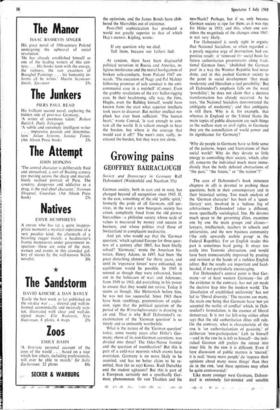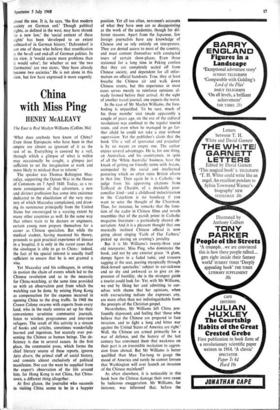Growing pains
GEOFFREY BARRACLOUGH
German society, both in east and in west, has changed beyond all recognition since 1945. If, in the east, something of the old 'public spirit,' formerly the pride of all Germans, still sur- vives, in the west a new bourgeois society has arisen, completely freed from the old prewar hierarchies—a philistine society whose scale of values is measured by money and success in business, and whose politics rival those of Switzerland in complacent mediocrity.
And yet, who would say that the 'German question,' which agitated Europe for three quar- ters of a century after 1865, has been finally solved? 'Germany,' wrote the American his- torian, Henry Adams, in 1897, had been 'the great disturbing element' for thirty years, and until its 'expansive forces' were exhausted, no equilibrium would be possible. In 1945 it seemed as though they were exhausted, burnt out in the holocaust of war; and Adenauer, from 1949 to 1963, did everything in his power to ensure that they would not revive. Today it seems as though, like Metternich before him, he was not too successful. Since 1963 there have been rumblings, premonitions of explo- sion, signs that the political quietism of the period of the Wirtschaftswunder is drawing to an end. That is why Ralf Dahrendorf's re- examination of the 'German question' is so timely and so eminently worthwhile.
What is the nature of the 'German question' today, some twenty years after Hitler's Ger- many, shorn of its non-German accretions, was divided into three? The Oder-Neisse frontier and the question of reunification? But this is part of a cold-war neurosis which events have overtaken. Germany is no more likely to be reunited, and has no better claim to be re- united, than (let us say) Korea. Rudi Dutschke and the student agitators? But this is part of a European, certainly not a specifically Ger- man, phenomenon. Or von Thadden and his
tr1i .15.. t;wn: et.
neo-Nazis? Perhaps, but if so, only because German society is ripe for them, as it was ripe for Hitler in 1933; and this, when one con- siders the magnitude of the changes since 1945, is not very likely.
For Dahrendorf is surely right in arguing that National Socialism, so often regarded
a purely negative orgy of destruction, had one positive result: it 'removed 11), social basis for future authoritarian governments along tradi- tional German lines,' abolished the German past' in a way the Weimar Republic had never done, and in this pushed German society to the point in social development 'that made modernity and liberalism a real possibility.' But all Dahrendorf's emphasis falls on the word 'possibility'; he does not claim that a decisive transformation has already occurred. As he says, 'the National Socialists demonstrated the ambiguity of modernity'; and that ambiguity is still there. Why is it, for example, that whereas in England or the United States the main topics of public discussion are such things as the welfare state or civil rights, in Germany they are the constellation of world power and its significance for Germany?
`Why do people in Germany have so little sense of the patterns, hopes and frustrations of their social world? Why do they devote so little energy to controlling their society, which, after all, concerns the individual much more imme- diately than the hotly debated abstractions of "the past," "the future," or "the nation"?'
The core of Dahrendorf's book (nineteen chapters in all) is devoted to probing these questions, both in their contemporary and in their historical setting. Too much analysis of the 'German character' has been of a 'quasi- literary' sort, involved in a 'tedious fog of arbitrariness.' Dahrendorf takes a different, more specifically sociological, line. He devotes much space to the governing elites, examines one by one the main groups and classes— lawyers, intellectuals, teachers in schools and universities, and the new business community (`the only upwardly mobile group' in the Federal Republic). For an English reader this part is sometimes hard going. It strays too easily into Teutonic abstraction, and would have been immeasurably improved by pruning and revision at the hands of a ruthless English editor. But the results are important and hard- headed, if not particularly encouraging.
For Dahrendorf's central point is that Ger- many—or at least western Germany—for all the evidence to the contrary, has not yet made the decisive leap into the modern world. The `dissolution of established uniformity' has not led to 'liberal diversity.' The reasons are many, the main one being that Germans have 'not yet accepted the reality of conflict' which, in Dah- rendorf's formulation, is the essence of liberal democracy. It is not (as left-wing critics often say) that the old authoritarian elites still rule. On the contrary, what is characteristic of the FDR is 'an authoritarianism of passivity,' of deliberate 'non-participation.' Left to himself —and in the FDR he is left to himself—the indi- vidual German still prefers the retreat into inner life. In the DDR it is different. Even if here discussion of 'public matters is 'steered,' it is real; 'many more people' do 'express their opinions about many more things' than they do in the FDR, 'and these opinions may often be quite controversial.
Like many younger west Germans, Dahren- dorf is extremely fair-minded and sensible
n . 131 Jr At. about tbe DDR. It is, he says, 'the first modem society on German soil.' Though political rights, as defined in the west, may have shrunk 'to a new low,' the 'social context of these rights' has been 'developed to an extent unheard-of in German history.' Dahrendorf is not one of those who believe that reunification is the be-all and end-all of German politics. In his view, it 'would create more problems than it would solve'; for whether or not 'the two Germanies' are two states, 'they have already become two societies.' He is not alone in this view, but few have expressed it more cogently.











































 Previous page
Previous page